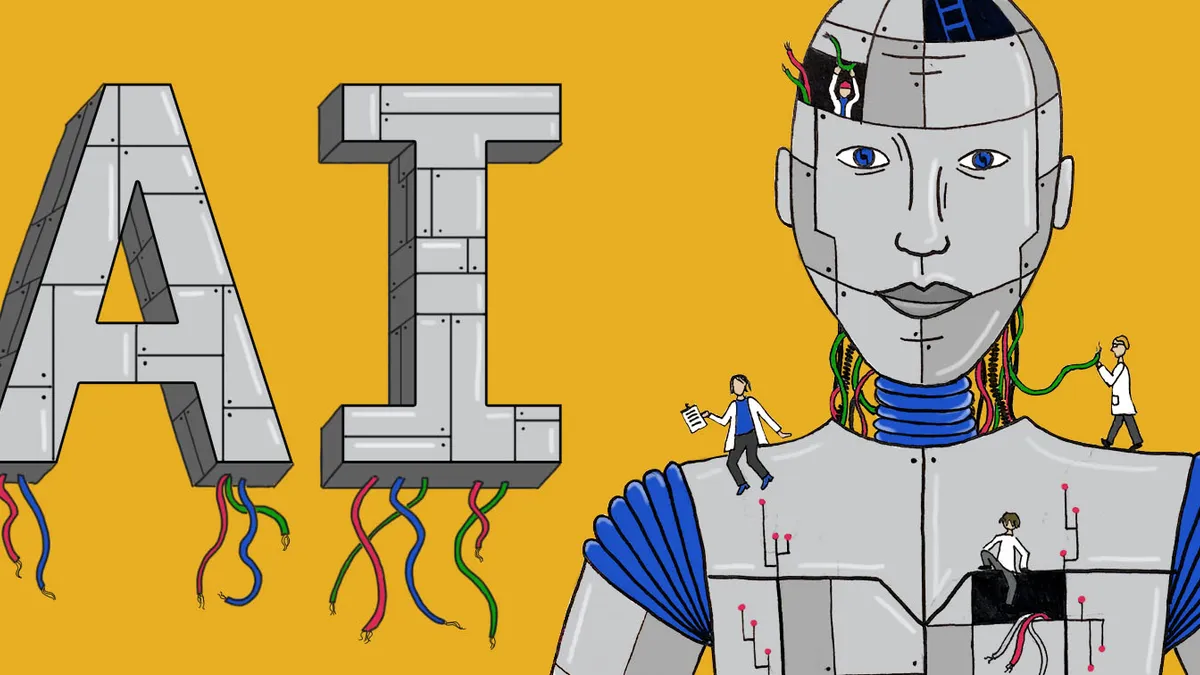This is a part of a series of stories featuring CIO Dive's business technology trends for 2018. You can find the rest of the trends here.
Nearly two decades ago, when Amazon began offering predictive book recommendations based off previous orders, no one batted an eye when new types of automated convenience emerged.
However, when that same type of convenience enters the workplace, an inherent uneasiness arises.
Automation is the next frontier for the enterprise, and artificial intelligence (AI) is more mainstream than ever. As algorithms' ability to learn expands, so does viable applications in the enterprise.
By 2021, AI is forecast to recover about 6.2 billion hours of productivity and add $2.9 trillion in business value.
This year companies are expected to integrate AI solutions into their networks. Here are five trends to expect from the technology in the year to come:
1. AI will get the cloud treatment
The next wave of tech following the cloud and analytics includes blockchain, cognitive technologies, digital reality and next generation engagement. "Of the big macro forces of tech disruption, cognitive is the one that requires the least amount of convincing," said Bill Briggs, chief technology officer at Deloitte.
The implications of AI are almost as grandiose as those of the cloud about five years ago. The idea of augmenting or eliminating remedial tasks altogether is not one companies can ignore.
Companies that do not implement AI solutions face the same setbacks the "digital laggards" of today are facing: a shortage of talent and resources and wasted investments.
Companies need to start gathering their resources now to prepare a workforce adaptable to change. However, there are less than 10,000 candidates specialized in AI, so creating a digitally-savvy work environment attractive enough to draw in potential hires is a must.
2. Look for AI talent in software experts
Companies still face a shallow candidate pool, so it's recommended to train existing data architects, database administrators and software engineers, according to Forrester.
The general talents for AI specialists are hard to pinpoint, but data scientists and those who showcase "variations and augmentations of a core computer science expertise" are viable candidates, according to Mike Piech, VP and GM for Middleware, Red Hat.
Foundational programming languages like Java, Python and R are all applicable, but AI is also providing intelligent applications and will inevitability change how software is used and created. The "basic truism" of the AI movement is the impact it is having on software providers, according to Piech.
"When you have [AI] learning involved, you write software that you sort of set in motion and that over time it learns, it changes what it does," said Piech. Companies should expect software to continue to evolve as AI "tunes" what it looks for and how it reacts, which elicits new and different kinds of experiences.
But speaking about AI without Big Data is nearly impossible.
AI is reliant on learning from, sifting through and analyzing the data that companies store. "To be able to interact with people on a highly nuanced level, AI needs to be developed based on real-world data, and massive amounts of it," said Dr. Rana el Kaliousby, CEO and co-founder of Affectiva.
3. Companies may look to HR to handle AI biases
The integrity of the data AI uses is of top concern for IT leaders and the "no collar workforce," according to Briggs. "The machine is augmenting the individual, and either it can be used to expose the biases that are coming through in the decisions that the individual is making, or the individual can be used to help us compensate for the biases that might be in the data itself."
However, if a bot or algorithm is operating separately from human interference, companies will have to decide what the right protocol is for correcting a biased mistake.
"Is it a bug? Do you treat it like a technical incident that needs to be resolved? Is it a training issue?" asked Briggs. Or, "is it a disciplinary action that needs to be taken, if that's the case, how do you discipline a virtual, automated worker?"
The answer to these questions are dependent on the characteristics of the workload and the culture of the company.
4. Companies will rely on AI for business decisions
About one-fourth of companies expect to depend on AI making real-time decisions in 2018 as well as instructing supplies and employees. Entrusting AI applications with such responsibility puts even more importance on the purity of the data.
Companies need a proactive approach to avoiding biases. "We will see increased industry collaboration, to open the conversation on how we can ensure that people are developing and training AI algorithms to avoid replicating societal biases," said Dr. el Kaliouby. "Companies will understand that this is both the right thing to do and good for business, making AI ethics a fundamental part of computer science education."
In order to trust AI with such responsibilities, companies need to reevaluate data that's used as a "computer dictionary." Research is also needed for deploying more algorithms to look at various groups in data sets instead of measuring unique groups with the same criteria.
5. CIOs will have authority over AI with the help of the C-suite
Even with all of its hype, a new technology cannot prove its worth without C-suite approval.
It is a matter of getting comfortable with a concept, but when fiscal benefits are clearly outlined, most AI trepidation is dissolved. Companies need to set the foundation for AI implementation on "what's possible now," said Briggs, and that also includes finding the right workforce.
CIOs will be tasked with dictating the direction of AI in their company. This includes deciding which services need augmented assistance the most, how those services need to adapt to accommodate AI and what new services, inconceivable before AI, can be made.
Without a clear understanding of how AI can take effect in a company, CIOs will struggle with convincing C-suite officials of its entire investment. It also may not hurt to bring the best chocolate chip cookie recipe generated by AI to the pitch meeting.






















